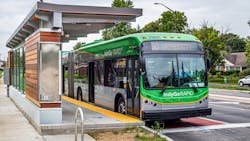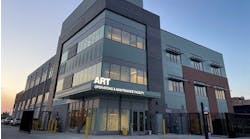IndyGo implements inductive charging along Red Line to charge buses en route
IndyGo has plans to recharge its fleet of electric buses while en route, allowing the agency’s bus rapid transit (BRT) lines to better serve the Marion County, Ind., community.
This process will expand mobility options and help improve on-time performance and service reliability.
Through a wireless power transfer process called inductive charging, electric buses will receive the power they need to get to and from each destination smoothly and without interruption.
“The en route inductive charging process is the next step to ensure we safely and reliably take riders where they need to go,” said Chief Operating Officer Aaron Vogel. “These advancements will be a unique way for us, as a community-serving agency, to move forward.”
When the Red Line launched in September 2019, it faced some challenges. The electric buses IndyGo ordered from BYD, did not charge as promised. Severe weather conditions added to the issue.
Over the last two years, IndyGo says BYD has worked in good faith to remedy the mileage range and accommodate the charging needs to reach its contractual obligations for IndyGo’s electric bus fleet. The company paid for the charging plate retrofit for each bus, the establishment of a temporary charging location in late 2019 and three permanent inductive charging stations in 2021 along the Red and Purple Lines.
IndyGo has installed one inductive charging station at 6410 N. College Ave. In the coming months, the agency will have additional charging stations placed at 8925 Madison Ave and Ivy Tech Community College – Lawrence Campus for the future Purple Line.
The process is simple. First, a wireless pad is buried in the pavement. When the bus is ready to be recharged, it simply drives over the pad, stops and lowers to activate the energy transfer allowing the bus to recharge.
IndyGo says the charging process is easy, efficient and safe. Passengers are welcome to wait on the bus as recharging occurs. Walking over the charging pad buried beneath the concrete when it’s not activated is not harmful. Finally, the energy transfer between the pad on the bus and in the ground is virtually undetectable.
With the addition of the en-route inductive charging stations, which are designed specifically for BYD buses, IndyGo’s fleet of electric buses are achieving a total of 200-plus miles per day.
Additionally, IndyGo’s BRT boarding stations are designed and built to work specifically with the BYD bus, allowing for level boarding to make them easily accessible for everyone, including those in a wheelchair.
There are several additional benefits with installing in-route charging ports, including:
- Cost efficiency.
- Minimal environmental impact, including no produced emissions.
- 10-15-minute charging periods.
- Operational through all weather conditions.
- Requires little maintenance.
“This development is propelling IndyGo in the right direction. We can’t wait to see where this partnership takes us in the future,” Vogel said.
IndyGo is preparing to purchase an additional 28 BYD buses for the Purple Line at the end of 2021.


